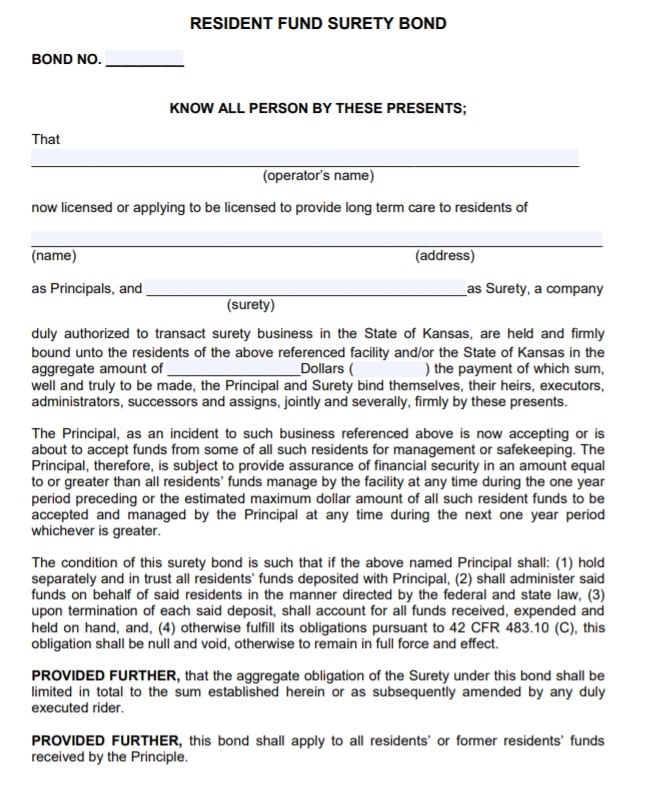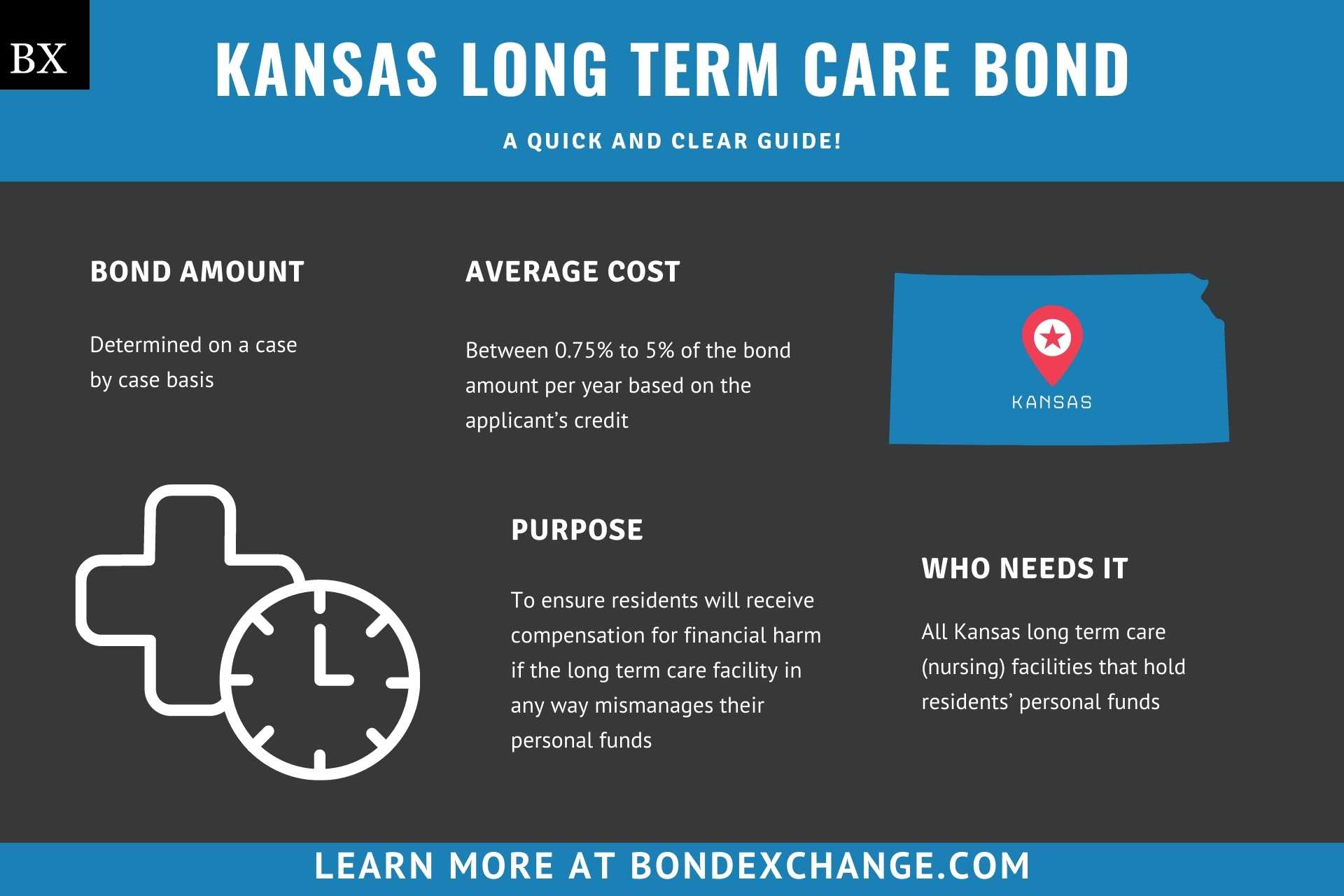Kansas Long Term Care Bond: A Comprehensive Guide
This guide provides information for insurance agents to help their customers obtain a Kansas Long Term Care bond
At a Glance:
- Lowest Cost: 0.75% of the bond amount per year based on the applicant’s credit
- Bond Amount: Determined on a case by case basis (more on this later)
- Who Needs it: All Kansas long term care (nursing) facilities that hold residents’ personal funds
- Purpose: To ensure residents will receive compensation for financial harm if the long term care facility in any way mismanages their personal funds
- Who Regulates Long Term Care Facilities in Kansas: The Kansas Department for Aging and Disability Services

Background
Kansas Statute 39-926 requires all long term care facilities operating in the state to obtain a license with the Department for Aging and Disability Services. The Kansas legislature enacted the licensing laws and regulations to ensure that long term care facilities engage in ethical business practices. To provide financial security for the enforcement of the licensing law, long term care facilities that hold resident funds must purchase and maintain a surety bond, to be eligible for licensure. Additionally, federal statute 483.10 requires all long-term care facilities that hold patient funds in a trust account to purchase a surety bond or other similar form of security. However, the federal regulation leaves the implementation and enforcement of this requirement to individual states.
What is the Purpose of the Kansas Long Term Care Bond?
Kansas requires long term care facilities that hold resident funds to purchase a surety bond as part of the application process to obtain a business license. The bond ensures that residents of the long term care facility will receive compensation for financial harm if the facility fails to abide by the regulations set forth in Kansas statute 28-39-149. Specifically, the bond protects residents if the facility in any way mismanges their personal funds. In short, the bond is a type of insurance that protects residents if the long term care facility acts unethically with their funds.
How Can an Insurance Agent Obtain a Kansas Long Term Care Surety Bond?
BondExchange makes obtaining a Kansas Long Term Care bond easy. Simply log in to your account and use our keyword search to find the “long term care” bond in our database. Don’t have a login? Gain access now and let us help you satisfy your customers’ needs. Our friendly underwriting staff is available by phone at (800) 438-1162, email, or chat from 7:30 AM to 7:00 PM EST to assist you.
At BondExchange, our 40 years of experience, leading technology, and access to markets ensures that we have the knowledge and resources to provide your clients with fast and friendly service whether obtaining quotes or issuing bonds.
Not an agent? Then let us pair you with one!
Click the above image to find a BX Agent near you
How is the Bond Amount Determined?
The Department for Aging and Disability Services dictates that the bond amount must be equal to or greater than all resident funds managed by the facility at any time during the previous 12 month period or the estimated maximum amount of resident funds to be managed by the facility in the next 12 months, whichever is greater.
Is a Credit Check Required for the Kansas Long Term Care Bond?
Surety companies will run a credit check on the owners of the long term care facility to determine eligibility and pricing for the Kansas Long Term Care bond. Owners with excellent credit and work experience can expect to receive the best rates. Owners with poor credit may be declined by some surety companies or pay higher rates. The credit check is a “soft hit”, meaning that the credit check will not affect the owner’s credit.
How Much Does the Kansas Long Term Care Bond Cost?
The Kansas Long Term Care bond can cost anywhere between 0.75% to 5% of the bond amount per year. Insurance companies determine the rate based on a number of factors including your customer’s credit score and experience. The chart below offers a quick reference for the bond cost on a $20,000 bond requirement.
$20,000 Long Term Care Bond Cost
| Credit Score | Bond Cost (1 year) | Bond Cost (1 month) |
|---|---|---|
| 800+ | $150 | $15 |
| 625 – 799 | $200 | $20 |
| 600 – 624 | $500 | $50 |
| 575 – 599 | $600 | $60 |
| 500 – 574 | $1,000 | $100 |
*The credit score ranges do not include other factors that may result in a change to the annual premium offered to your customers, including but not limited to, years of experience and underlying credit factors contained within the business owner’s credit report.
Who is Required to Purchase the Kansas Long Term Care Bond?
Kansas requires all long term care facilities, also known as “nursing facilities”, that hold residents’ personal funds to purchase a surety bond. To paraphrase Kansas statute 39-923, a nursing facility is a facility that operates 24/7 and cares for 6 or more individuals, that are not related to the facility’s administrator, by providing skilled nursing services.

BondExchange now offers monthly pay-as-you-go subscriptions for surety bonds. Your customers are able to purchase their bonds on a monthly basis and cancel them anytime. Learn more here.
How Do Kansas Nursing Facilities Apply for a License?
Nursing facilities in Kansas must navigate several steps to secure their license. Below are the general guidelines, but applicants should refer to the application instructions for details on the process.
License Period – All Kansas Nursing Facility Licenses expire annually and must be renewed before the expiration date
Step 1 – Purchase a Surety Bond
Nursing facilities that hold residents’ personal funds must purchase and maintain a surety bond
Step 2 – Purchase Insurance
Kansas requires nursing facilities to purchase professional liability insurance (limits not specified)
Step 3 – Complete the New Construction Process
If the nursing facility is a newly constructed and unlicensed building or is being significantly remodeled, then the applicant must perform the following actions:
-
- Email a letter of intent to [email protected]
- Pass a site inspection conducted by a Physical Environmental Specialist from the State Fire Marshall’s Office
- Attend a plan review meeting
- Provide all documentation needed to begin the construction process
License applicants who are not constructing a new facility or significantly remodeling an existing one may skip Step 2
Step 4 – Apply for Licensure
All Kansas Nursing Facility License applications should be mailed to the following address:
Kansas Department for Aging and Disability Services
Survey, Certification and Credentialing Commission
503 S. Kansas Ave
Topeka, Kansas 66603
Nursing facilities must complete the application in its entirety, and submit the following items:
-
- Copy of the warranty deed or lease agreement to the facility
- Detailed projected budget for the facility’s first 12 months of operation that is signed by the company’s principal officer and contains evidence of sufficient capital
- List of all nursing facilities the has or has previously had any ownership stake in
- Evidence the facility can comply with all licensing requirements
- Resumes for all of the facility’s executive officers
Nursing facilities must pay a $100 fee, plus $30 per additional bed, when submitting their application.
Additionally, nursing facilities must submit items to the Office of the State Fire Marshall, as well all company policies that are outlined here. Applicants constructing a new facility must wait until construction is at least 50% complete prior to submitting their license application. To obtain a Medicaid certification, applicants must follow the steps described here.
How do Kansas Nursing Facilities Renew Their License?
Nursing facilities can renew their license online here. All Kansas Nursing Facility Licenses expire annually and must be renewed before the expiration date.
What are the Insurance Requirements for Nursing Facilities in Kansas?
Kansas requires nursing facilities to purchase professional liability insurance (limits not specified). Nursing facilities that hold residents’ personal funds must purchase and maintain a surety bond in an amount equal to or greater than all resident funds managed by the facility at any time during the previous 12 month period or the estimated maximum amount of resident funds to be managed by the facility in the next 12 months, whichever is greater.
How Do Kansas Nursing Facilities File Their Bond?
Nursing facilities should mail their completed bond form, including the power of attorney, to the following address:
Kansas Department for Aging and Disability Services
Survey, Certification and Credentialing Commission
503 S. Kansas Ave
Topeka, Kansas 66603
The surety bond requires signatures from both the surety company that issues the bond and from a representative of the nursing facility. The surety company should include the following information on the bond form:
- Legal name and address of entity/individual(s) buying the bond
- Surety company’s name
- Bond amount
- Date the bond goes into effect
- Date the bond is signed
What Can Kansas Nursing Facilities Do to Avoid Claims Against Their Bond?
To avoid claims on their bond, nursing facilities in Kansas must ensure that they:
- Hold all resident funds in a separate trust account
- Properly administer all resident funds
- Account for all resident funds received when a deposit is terminated
What Other Insurance Products Can Agents Offer Nursing Facilities in Kansas?
Kansas requires nursing facilities to purchase liability insurance as a prerequisite to obtaining a business license. However, most reputable businesses will seek to obtain this insurance anyway. Bonds are our only business at BondExchange, so we do not issue any other types of insurance, but our agents often utilize brokers for this specific line of business. A list of brokers in this space can be found here.
How Can Insurance Agents Prospect for Kansas Nursing Facility Customers?
Kansas conveniently provides a public database to search for active nursing facilities in the state. The database can be accessed here. Contact BondExchange for additional marketing resources. Agents can also leverage our print-mail relationships for discounted mailing services.

